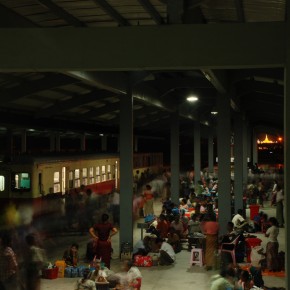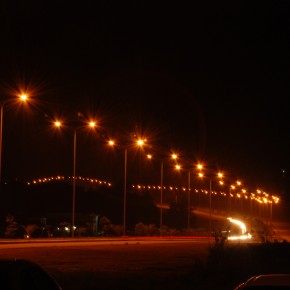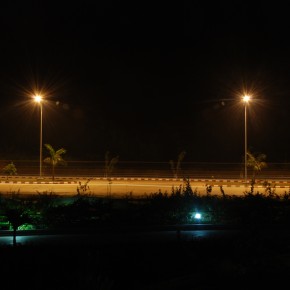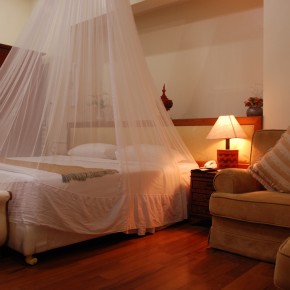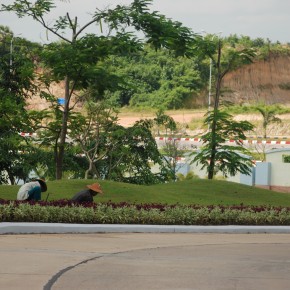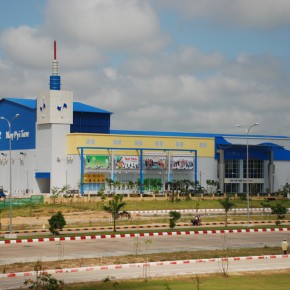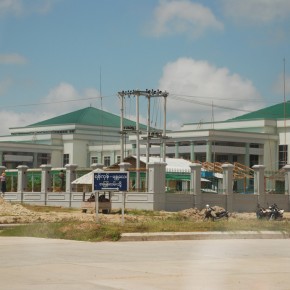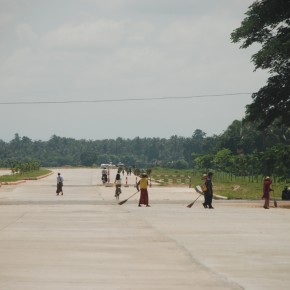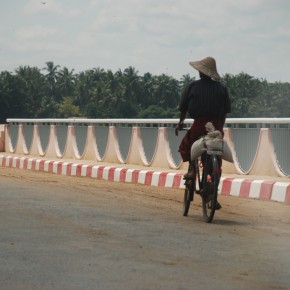BURMA’S new capital city lies about 10 hours’ drive – or a short, white-knuckled flight on an ageing Fokker-27 – from Rangoon, the country’s largest city and former capital. A vast, empty plain of snaking arterial roads and low-density development, Naypyidaw is unlikely to experience anything approaching the so-called “Saffron Revolution” that brought central Rangoon to a standstill in 2007.
For one thing, there is no obvious city center or public space of any sort. Hotels, residential areas and government buildings are quarantined in designated “zones” separated by miles of six-lane highways, cutting swathes through tracts of untouched jungle. The only visual point of reference – and then, only at night – is the golden inverted cone of the Uppatasanti Pagoda, a life-size replica of the hallowed Shwedagon Pagoda in Rangoon.
As Burma prepares to go to the polls later this year as part of the military government’s much-touted “roadmap to democracy,” the view from Naypyidaw appears grim. When the country’s ruling generals moved the capital north in 2005, some observers saw it as a defensive maneuver, a move into strategic isolation designed to limit the threat of popular upheaval. Siddharth Varadarajan, a journalist at The Hindu, described Naypyidaw as “the ultimate insurance against regime change, a masterpiece of planning designed to defeat any putative ‘colour revolution’ – not by tanks and water cannons, but by geometry and cartography”.
The approach of the elections, which many expect to fall on the auspicious date of October 10 (10-10-2010), has raised some hopes of a democratic opening for the isolated country. One observer said recently that the creation of new legislative bodies, however constrained, will “inadvertently” grant citizens the opportunity to influence decision-making. The signs so far, however, have vindicated the pessimists. Despite reports that election campaigning has already begun in Karen State, the epicentre of a decades-long ethnic Karen insurgency, the rules remain weighted heavily towards the junta. Five election laws promulgated earlier this month stipulate that 110 of the 440 seats in a proposed House of Representatives will be reserved for military representatives and that 56 in the 224-member House of Nationalities will be chosen by the head of the army, Senior General Than Shwe.
A Political Party Registration Law also includes provisions barring democracy icon Aung San Suu Kyi from participation in the election – and possibly even from membership in the National League of Democracy (NLD), the party she led to a landslide victory in elections in 1990. The laws also ban prisoners from being members of political parties, effectively barring the participation of over 2,000 people jailed on politically motivated charges, including several senior NLD members. Other laws state that a five-member Election Commission, appointed by the junta, will have final say over election results, presaging a repeat of the 1990 poll, when the military simply refused to acknowledge the NLD’s victory.
On March 8, United States Assistant Secretary of State for Public Affairs P.J. Crowley said Washington was “troubled” by the decision to exclude Suu Kyi from the process. “This is a step in the wrong direction,” Crowley told reporters in Washington. “The political party registration law makes a mockery of the democratic process and ensures that the upcoming elections will be devoid of credibility.” Human Rights Watch was less equivocal. “The new law’s assault on opposition parties is sadly predictable,” said Brad Adams, the Asia director at Human Rights Watch said in a statement March 10. “It continues the sham political process that is aimed at creating the appearance of civilian rule with a military spine.” Philippine Foreign Secretary Alberto Romulo told The Associated Press that an election without Suu Kyi would be a “farce.”
Whatever the future of “discipline flourishing genuine multi-party democracy”, as the regime refers to it, the isolated new capital may also suggest that the regime is also following a roadmap back into Burma’s past, away from the promise of an open, democratic future. Michael Aung-Thwin, a Professor of Asian Studies at the University of Hawaii at Manoa, says the relocation of the capital is seen by the junta as a move back into the historical, cultural and geographic heart of Burma. Naypyidaw lies close to – and has all but absorbed – the township of Pyinmana, which lies at the historical heart of the country. In relocating the capital from Rangoon, which served as the capital under British rule, Aung-Thwin suggests the move represents a concerted rejection of Burma’s colonial past.
Sean Turnell, an Associate Professor of Economics at Macquarie University in Sydney, says that the strategic motivation for the relocation, as well as its cost – the government “could not have got much change out of US$1 billion,” he says – also bodes ill for the junta’s commitment to openness. “Given that much of the motivation [for the relocation] extends from a certain ‘siege mentality’, it’s illustrative that we must regard the upcoming elections, and other moves, with a great deal of scepticism,” he said.
Reports from inside Burma indicate that many citizens have adopted similar attitudes. One woman quoted in The Irrawaddy news magazine, run by Burmese exiles in Chiang Mai, Thailand, rejected the prospect of fair elections outright. “I don’t even want to talk about the election,” she told reporters. “However we vote, [the regime] will do whatever they want.” Most of the 300 people informally polled by reporters from the magazine expressed similar views.
Burma’s ethnic minority “problem” – a perennial challenge since independence – has also been thrown off balance by recent tensions along the Sino-Burmese border. After signing ceasefire agreements with Rangoon from the late 1980s onwards, many ethnic separatist groups were given the right to retain their arms and formed de facto autonomous statelets in outlying parts of the country. But over the past year, the government has been pressing ethnic ceasefire groups to join a unified Border Guard Force (BGF) under government control in time for this year’s election, prompting fears of renewed fighting.
In August, ethnic forces in Kokang Special Region, a part of Burma’s Shan State, clashed with government troops, driving thousands of refugees over the border into Yunnan province in China. A deadline for ethnic armies to join the BGF passed on March 15; just a few days later reports surfaced of clashes between government troops and an ethnic Shan armies elsewhere in Shan State. Some have even speculated that the election will be delayed until the BGF issue is resolved.
It might be too soon to say with certainty what a putative “democracy with Burmese characteristics” will boil down to in practice, but the signs so far are not especially promising.
[Published in Asia Sentinel, March 19, 2010]


